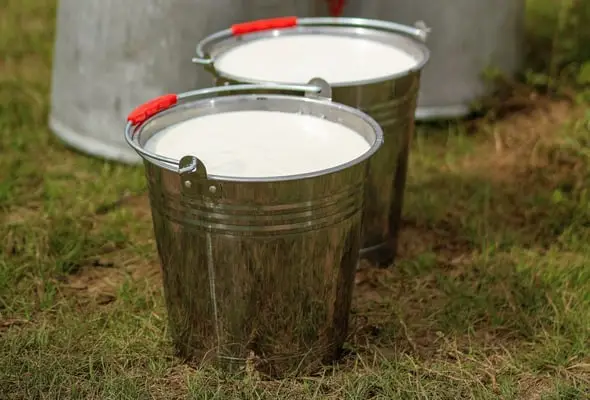In the western world, cows milk has long been a refrigerator staple. In recent years however, changing health advice has led to more consumers seeking alternatives.
Goat’s milk has soared in popularity in the last decade, and the search for further alternatives has led many to wonder which other animals produce milk that is safe for humans to ingest. For instance, do horses produce milk?
While most of us probably can’t or don’t want to imagine putting horse milk in our morning coffee, this question generates a few eye-opening revelations!
Do Horses Produce Milk?
Surprisingly, horses do produce milk. It is said to be similar in composition to human milk. In some countries, it is even used as a substitute for it. Horse milk has a sweet taste, and is a key ingredient in Koumiss, a fermented milk drink that is considered a delicacy in Central Asia and Siberia.
Horses produce milk from their udders, which differ greatly in physical composition from cow udders. A cow has one udder bearing four teats, while horses have two udders, each bearing one teat.
In addition, a cow’s udder consists of four mammary glands, while a horse’s udder has only two. A horses udders are located between their hind legs, and usually do not protrude unless the mare is pregnant.
Why Do Horses Produce Milk?
Like other mammals, horses secrete milk during the lactation process to feed their young. High-quality milk is essential to the health of a foal, and experts recommend paying particular attention to the diets of pregnant mares. An elevation in calorie consumption is strongly suggested to support fetal growth and the production of milk.

Until the age of five or six months, the foal is dependent entirely on the mare’s milk for survival. Experts suggest giving supplements to lactating mares that contain calcium and phosphorus.
A pregnant mare must have adequate reserves of minerals like manganese, copper, magnesium and zinc, as these are essential for the development of cartilage, tendons and ligaments in their offspring.
Can a Horse Produce Milk if Not Pregnant?
A horse will only produce as much milk as its offspring requires. It is unusual for a horse to produce milk if they are not pregnant, but it does occur on occasion.
If a horse who isn’t pregnant produces milk, this could be caused by abnormal hormone production. As this can indicate the presence of a tumor in the gland, veterinary consultation is recommended.
Another cause of milk production in the case of a non-pregnant mare is the ingestion of phytoestrogens. These are hormones produced in plants, for instance, some types of clover. In this case, close monitoring of the food source is required.
Is Horse Milk Better Than Cows Milk?
Horse milk has proven health benefits. It is rich in Vitamin A, B-family vitamins, Vitamin C, Vitamin E, potassium, iron, calcium, and magnesium.

The question of whether it is better than cow’s milk for human consumption, however, remains up for debate.
Mare’s milk is recommended for people whose bodies cannot tolerate cow’s milk, as it is much more easily digested. It is also rich in lactoferrin, a glycoprotein that facilitates iron absorption in the body.
Mare’s milk has the advantage of possessing antibacterial properties, due to a lower amount of casein present than in cows milk. It is said to be useful in aiding the healing of intestinal inflammation and mouth ulcers.
As it contains potassium, a natural vasodilator, it can also increase blood flow and lower the risk of medically related issues in humans.
The growing prevalence of mares milk in beauty products is also worth noting, with several up-and-coming cosmetic manufacturers now employing the ingredient in their skincare ranges. Cleopatra herself was mythologized as having bathed in it, which certainly doesn’t hurt their cause!
Is Horse Milk Safe to Drink?
Horse milk is safe to drink, and many say, even quite delicious! Fans of horse milk say it has a sweet, nutty flavor. The aforementioned Koumiss is a beverage of fermented mare’s milk originated by the nomadic peoples of Central Asia in the sixteenth century and is still considered a delicacy today.
However, there are several reasons why horse milk is nowhere near as widely consumed as cow’s milk. A horse’s teats are much smaller than those found on cows, with each teat comprising two small holes at the tip. A cow’s teat is comparatively large, making it significantly easier to milk, and easier to ascertain and control the direction of the milk flow.
As previously mentioned, horses typically produce only as much milk as their offspring require, whereas dairy cows are bred specifically to produce vast quantities of milk for human consumption.
Where Can I Buy Horse Milk?
Most of us would probably feel a little discombobulated to see a carton of horse milk in our local grocery store! However, if this article has sparked your curiosity, there are places where you can procure this rare beverage, although they are limited.
Online marketplaces are your best bet, particularly those offering Mongolian fare. If the idea of having milk shipped to you doesn’t exactly whet your appetite, your best bet could be a spot of tourism!
Mares milk is far more prolific in Europe, Central Asia, and Siberia than it is in the United States or Canada. Even Britain has online farms that offer bottles of the beverage for sale.
Incorporating a tasting of the curious libation into any future travel plans to these regions would be a unique way to expand your palate and embrace the local culture!
Conclusion
In summary, horses do produce milk. Although it offers many essential vitamins and minerals, and has many positive properties, it differs greatly in availability and abundance when compared with the milk of a cow.
Mares typically only produce enough milk to provide for their immediate offspring. When a mare produces milk outside of the window of pregnancy and child rearing, it can be a signifier of a serious health or diet issue that needs addressing.
Mare’s milk isn’t widely accepted or obtainable in the United States, but it is not impossible to get for those truly committed. If you’re willing to travel, it is substantially easier to acquire in Central Asia and Europe. If you’re willing to accept the substitute of powdered mares milk, there is also that option through various online marketplaces.

